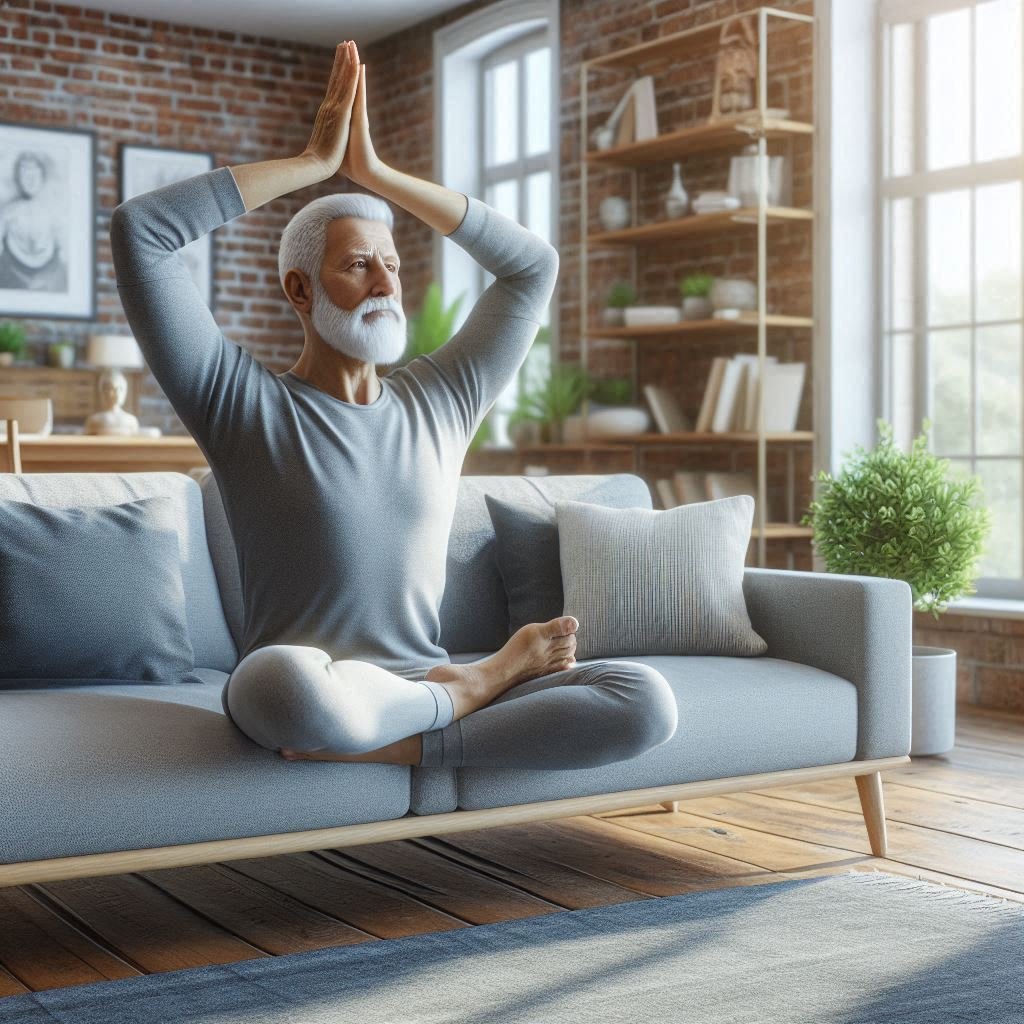
Liz Franklin has taught chair yoga to seniors for several years now, so she really knows what to expect when leading a class for the 50+ crowd. Here is what she thinks is important to be mindful of.
Be punctual
Your students will almost all arrive with plenty of time to spare before class, so you better be there at least 15 minutes before it starts. Make sure you dismiss the class on time, too.
Never call your students “old”
The first baby boomers are starting to turn 60, and one boomer turns 50 every 8 seconds. So watch out – here comes the bubble of baby boomer seniors!
As boomers, we never really wanted to grow up, so we certainly are not even considering “getting old”. Avoid using language such as “slowing down”, “golden years”, “elderly”, or “aging”. “Active adult” is regarded as pretty safe. What is wrong with that, anyhow? That is what you’re hoping to accomplish by having them in your yoga class!
Expect many students to be hearing and sight impaired
Medical science continues to improve rapidly, but it is still common for seniors to have lost some acuteness in their hearing and/or eyesight.
Make sure you speak up at all times, even more so than you do in your other classes. If necessary, invest in an inexpensive PA system.
When offering them printed materials such as a class schedule or inspirational handouts, make sure the type is a fairly large. This applies to your web site, if you have one.
Be aware of health problems
Partial loss of hearing and sight is probably the most common thing to watch out for, but there are a lot of other conditions that may present contraindications for particular asanas.
You should always be ready to use props, modify poses, or suggest and alternative pose.
A complete discussion of this subject is a whole other article, but I will say that you should carefully quiz new students about health problems and physical limitations, and always recommend checking with doctor.
Some will be conservative in their manner and dress
Some of your students will wear workout clothes, but others will come to class in casual street clothes that you would not see in most studios. It is not uncommon for them to leave their socks on, and we have seen a few that do not even take off their shoes.
Be especially cautious about doing adjustments least you offend someone.
Liz does not invite them to spread their buttock flesh to make contact with the sits bones – after all, you do not touch that part of your body in public!
Do not say much about the spiritual aspects of yoga
There are some fundamentalist Christians that put forth the idea that yoga is the work of the devil. Liz had one class sabotaged by a woman who insisted that chanting OM was calling the devil. There is not much you can do to change people’s minds about this, but you should be aware of this problem.
You also need to think about everything you say in class and decide if that could be misinterpreted as a call to change one’s spiritual attitude. Most of your students will have established their religious outlook on life long before they start a chair yoga class. You probably shouldn’t talk much about chakras, the Sanskrit names for asanas, awakening Kundlini energy, or any of the more spiritual aspects of yoga when teaching Yoga In Chairs.
Expect students to interrupt class with questions
Most of your chair yoga students will be new to yoga to start out with, and will have lots of questions. They may have health issues to ask about, and they sometimes just “don’t get it” the first time around.
Be patient with your students when they interrupt class with a question. Your chair yoga classes simply will not be as solemn as other classes.
Try to stay in touch with your students
Despite the fact that chair yoga classes are not as solemn and thoughtful as most, your students will take their commitment to you and the class very seriously. You probably will have a lot of continuity in the composition of the group. Also, they will often feel like they need to contact you if they will not be in class, especially if they know in advance that they will miss several classes.
Likewise, if they are not in class, they will usually be pleased that you took the time to check up on them. Doing so will also help keep people from drifting away. Of course, pay attention to how they react to having you checking up on them, and if they seemed to be annoyed by that, then back off. I will say that Liz has not had a single case where she felt like she was being a pest.
Conclusion
Teaching chair yoga to seniors is definitely a different experience than you have in most classes. However, if you pay attention to the things discussed above you will be much more successful in starting and maintaining chair yoga classes. In doing so you will be tapping into a huge yet underserved market and do a lot of good in the process.
Mark Franklin enjoys telling people about Liz Franklin’s Yoga In Chairs(r) because he knows it is helping people live healthier, happier, and longer lives. If you are a yoga teacher and you want to find out how you can build your practice while doing some REAL good in the world teaching chair yoga, visit [http://www.yogainchairs.com/teacher.asp].




